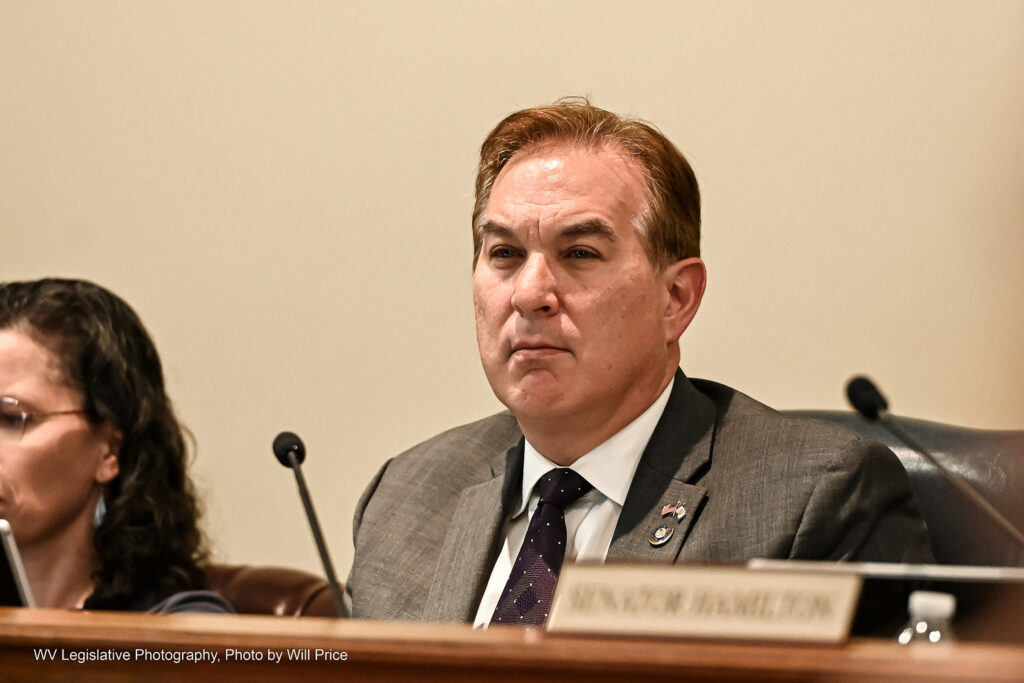About a dozen community members were invited to the Senate Judiciary Committee Thursday afternoon to discuss issues around the banning of three substances in a meeting that stretched for hours, before a confusing ending.
The committee spent close to three hours discussing a committee substitute for Senate Bill 546, which would update the state’s list of controlled substances.
The bill would add dozens of substances to the state code, but the committee’s discussion focused on three substances: the hemp-derived cannabinoids Delta 8 and Delta 10, as well as the derivative of a Southeast Asian plant with opioid-like properties known as Kratom.
Sen. Mike Stuart, R-Kanawha, is the bill’s lead sponsor. Throughout discussion, he compared the current situation of Delta 8, Delta 10 and Kratom in West Virginia to the start of the opioid epidemic.
“We’re seeing similarities today to what we saw at the beginning of the opiate crisis,” Stuart said. “If we could go back in time and make a change to what happened to this countryside in West Virginia, I think we would have made those changes.”
As written, the bill would put the three substances in Schedule 1, along with opiates, methamphetamine and psychedelics such as LSD. Stuart’s argument, supported by several guests including a police lieutenant, a psychiatrist specializing in addiction and the Poison Control Center, revolved around not only the danger of the substances, but specifically their ease of availability.
“The drug normalization of America knows no partisanship or socio-economical notation,” Stuart said. “This is not going to be an easy vote, because it’s become so widely dispersed throughout West Virginia.”
Other senators asked why the substances under discussion didn’t merit regulation instead of a full ban. Sen. Mike Caputo, D-Marion, asked as much of Amy Minor, the director of regulatory and environmental affairs with the West Virginia Department of Agriculture.
Minor’s office already regulates the legitimate production and sale of industrial hemp products in the state, including Delta 8 and Delta 10. Some Delta 8 and Delta 10 products sold in the state are illicit, and there is currently no regulation of Kratom in West Virginia.
“You definitely support an age restriction just the same as we do alcohol, same as we do tobacco, same as we do medical cannabis?” Caputo asked.
Minor said the Department of Agriculture was in favor of an age restriction of 18 years and older.
“Yeah, I don’t know why we don’t have it for this. I would rather see us, Mr. Chairman, moving in a direction of a regulation rather than what direction we’re moving here, but I’m just one opinion,” Caputo said.
Caputo’s point was supported by several guests, including an industrial hemp farmer and a woman who uses Kratom to mitigate symptoms of Lyme Disease.
More than two hours into the meeting, there were still several witnesses who had not been heard and the chairman, Sen. Charles Trump, R-Morgan, indicated a desire to adjourn and reconvene Friday to continue hearing testimony. However, the committee was thrown into procedural confusion after Sen. Laura Chapman, R-Ohio, unexpectedly moved to vote on the bill, ending public testimony and committee discussion.
After several other procedural motions, including a motion to adjourn the meeting in lieu of a vote, Trump was required to consult with the Senate parliamentarian, who informed him that the motion to vote would need to be carried through.
“I have no no more to say except for we heard all this testimony. I think that we’re all tired, but we all know how we’re going to vote on this and we should just agree to the language,” Chapman said.
The committee agreed on the language of the committee substitute for Senate Bill 546 and moved to report the same to the House. However, no bill was reported to the Senate from the Judiciary Committee Friday morning.























